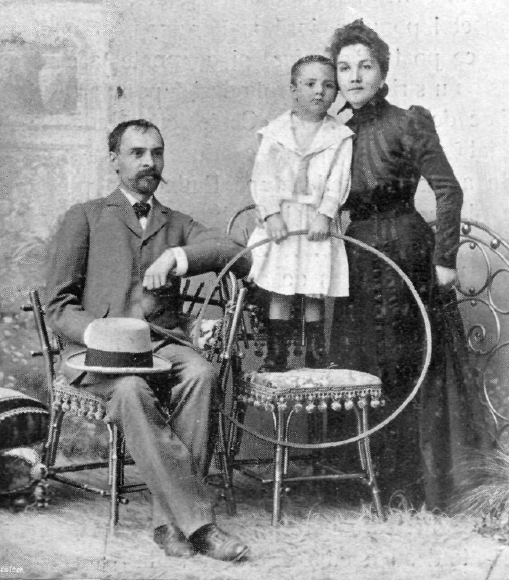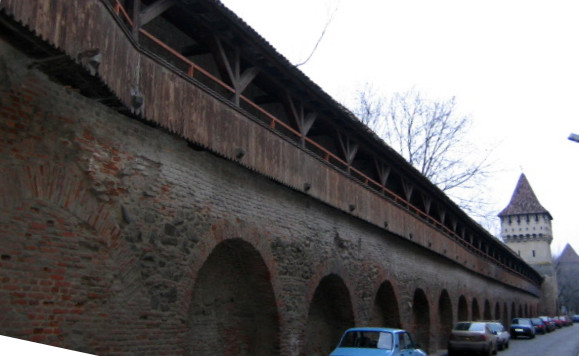|
Gheorghe Bogdan-Duică
Gheorghe Bogdan-Duică (born Gheorghe Bogdan; –September 21, 1934) was an Imperial Austrian-born Romanian literary critic. The son of a poor merchant family from Brașov, he attended several universities before launching a career as a critic, first in his native town and then in Czernowitz. Eventually settling in Bucharest, capital of the Romanian Old Kingdom, he managed to earn a university degree before teaching at a succession of high schools. Meanwhile, he continued publishing literary studies as well as intensifying an ardently nationalistic, Pan-Romanian activism. He urged the Romanian government to drop its neutrality policy and enter World War I; once this took place and his adopted home came under German occupation, he found himself arrested and deported to Bulgaria. After the war's conclusion and the union of Transylvania with Romania, he became a literature professor at the newly founded Cluj University. There, he served as rector in the late 1920s, but found himself i ... [...More Info...] [...Related Items...] OR: [Wikipedia] [Google] [Baidu] |
Ioan Meșotă
Ioan G. Meșotă (June 24, 1837 – ) was an Austro-Hungarian ethnic Romanian educator. Born into a peasant family in Dârste, a neighborhood of Brașov city in the Transylvania region,"Meșotă, Ioan G. (1837-1878)" in he was sent to the little local school at the age of six, attending for two years. He then completed the church school in Turcheș. In 1849, as a result of the [...More Info...] [...Related Items...] OR: [Wikipedia] [Google] [Baidu] |
Ion Budai-Deleanu
Ion Budai-Deleanu (January 6, 1760 – August 24, 1820) was a Romanian scholar, philologist, historian, poet, and a representative of the Transylvanian School. He was a member of the Order of the Golden and Rosy Cross, attending the society's meetings in Vienna. Biography He was born in Csigmó (today Cigmău), a village in the town of Algyógy (today Geoagiu, Hunedoara County), located in the western part of Transylvania. Budai-Deleanu studied at Blaj gymnasium between 1772 and 1777, having Samuil Micu-Klein as a professor among others, and then at the College of Saint Barbara in Vienna between 1777 and 1779. He completed his studies with a doctorate at the University of Erlau in 1783. He settled in Lemberg (now Lviv in Ukraine) in 1797 as a royal counsellor. His main works are the first draft of Supplex Libellus Valachorum and an epic poem, entitled '' Țiganiada'' ("Gypsy Epic"), about a band of gypsies that fought alongside the army of Vlad the Impaler, the medieval rul ... [...More Info...] [...Related Items...] OR: [Wikipedia] [Google] [Baidu] |
Petru Maior
Petru Maior (; 1756 in Marosvásárhely ''(now Târgu Mureș, Romania)'' – 14 February 1821 in Buda) was a Romanian writer who is considered one of the most influential personalities of the Age of Enlightenment in Transylvania (the Transylvanian School). Maior was a member of the Greek-Catholic clergy, a historian, philosopher, and linguist. Biography His family originated from Diciosânmartin. His father, George Maior, was a protopop in Marosvásárhely, and then in Căpușul de Câmpie. He studied at Seminary of Blaj and became a monk taking the name Paul at 14 years. Along with Samuil Micu-Klein and Ioachim Pop he received a scholarship at Pontificio Collegio Urbano de Propaganda Fide where he studied philosophy and theology for five years, between 1774 and 1779. He completed his education in Vienna, learning about the canon law of the Catholic Church. Petru Maior took a stand and responded, in 1812, by writing the ''Istoria pentru începutul românilor în Dachia ... [...More Info...] [...Related Items...] OR: [Wikipedia] [Google] [Baidu] |
Bukovina
Bukovina or ; ; ; ; , ; see also other languages. is a historical region at the crossroads of Central and Eastern Europe. It is located on the northern slopes of the central Eastern Carpathians and the adjoining plains, today divided between Romania and Ukraine. Inhabited by many cultures and peoples, settled by both Ukrainians ( Ruthenians) and Romanians (Moldavians), it became part of the Kievan Rus' and Pechenegs' territory early on during the 10th century and an integral part of the Principality of Moldavia in the 14th century where the capital of Moldavia, Suceava, was founded, eventually expanding its territory all the way to the Black Sea. Consequently, the culture of the Kievan Rus' spread in the region during the early Middle Ages. During the time of the Golden Horde, namely in the 14th century (or in the High Middle Ages), Bukovina became part of Moldavia under Hungarian suzerainty (i.e. under the medieval Kingdom of Hungary). According to the Moldo-Russian Ch ... [...More Info...] [...Related Items...] OR: [Wikipedia] [Google] [Baidu] |
Convorbiri Literare
''Convorbiri Literare'' () is a Romanian literary magazine published in Romania. It is among the most important journals of the nineteenth-century Romania. History and profile ''Convorbiri Literare'' was founded by Titu Maiorescu in 1867. The magazine was the organ of the Junimea group, a literary society which was established in 1864. The group included aristocratic Moldovans except for Titu Maiorescu. The magazine was first headquartered in Iaşi and later moved to Bucharest. ''Convorbiri Literare'' is published monthly by Convorbiri Literare publishing house. The magazine covered art reviews and translations of literary work. From 1906 the magazine also featured articles on plastic arts. The contributors included Alexandru Tzigara-Samurcaș and Apcar Baltazar among others. The other significant contributors were Mihai Eminescu, Ion Creangă and Ion Luca Caragiale. ''Convorbiri Literare'' has a conservative stance, and its literary rival was socialist Socialism is a ... [...More Info...] [...Related Items...] OR: [Wikipedia] [Google] [Baidu] |
Titu Maiorescu
Titu Liviu Maiorescu (; 15 February 1840 – 18 June 1917) was a Romanian literary critic and politician, founder of the ''Junimea'' Society. As a literary critic, he was instrumental in the development of Culture of Romania, Romanian culture in the second half of the 19th century. A member of the Conservative Party (Romania, 1880-1918), Conservative Party, he was Ministry of Foreign Affairs (Romania), Foreign Minister between 1910 and 1914 and Prime Minister of Romania from 1912 to 1913. He represented Romania at the Treaty of Bucharest, 1913, Peace Conference in Bucharest that ended the Balkan Wars, Second Balkan War. In politics as in culture he favoured German Empire, Germany over France. He opposed Romania's entry in World War I against Germany, but he nevertheless refused to collaborate with the German army after it had occupied Bucharest. Biography Titu Liviu Maiorescu was born in Craiova, on 15 February 1840. Maiorescu's mother, born Maria Popazu, was the sister of the s ... [...More Info...] [...Related Items...] OR: [Wikipedia] [Google] [Baidu] |
George Coșbuc
George Coșbuc (; 20 September 1866 – 9 May 1918) was a Romanian poet, translator, teacher, and journalist, best remembered for his verses describing, praising and eulogizing rural life, its many travails but also its occasions for joy. In 1916 he was elected titular member of the Romanian Academy. Biography Early life Coșbuc was born in Hordou, a village in northeastern Transylvania. His father, Sebastian Coșbuc, a Greek Catholic priest looked up to by his parish, drew from a line reputed to have yielded fourteen consecutive generations of priests. George attended primary school and graduated to secondary classes in the neighboring village of Telcs (''now: Telciu''). He happily took to the scholarly bent encouraged by his father, earning the praise of instructors and being chosen among the few who were to sign up for advanced courses at ''Gimnaziul Superior Românesc Greco-Catolic'' (Romanian Lyceum), a higher learning academy in the town of Năsăud. He soon foun ... [...More Info...] [...Related Items...] OR: [Wikipedia] [Google] [Baidu] |
Tribuna (Romania)
Tribuna may refer to: * ''Tribuna'' (Russian newspaper), a Russian weekly newspaper * '' Tribuna Portuguesa'', a bilingual newspaper serving the Portuguese-American community * Tribuna.com, a digital sports publisher * Tribuna Monumental, a monument in Mexico City * , a Brazilian TV station See also * La Tribuna (other) * La Tribune * The Tribune ''The Tribune'' or ''Tribune'' is the name of various newspapers: United States Daily California *''Oakland Tribune'' * ''The Tribune'' (San Luis Obispo) * ''The San Diego Union-Tribune'' *''San Gabriel Valley Tribune'' Indiana *''Kokomo Tribune' ... * * :cs:Tribuna {{disambiguation ... [...More Info...] [...Related Items...] OR: [Wikipedia] [Google] [Baidu] |
Sibiu
Sibiu ( , , , Hungarian: ''Nagyszeben'', , Transylvanian Saxon: ''Härmeschtat'' or ''Hermestatt'') is a city in central Romania, situated in the historical region of Transylvania. Located some north-west of Bucharest, the city straddles the Cibin River, a tributary of the Olt River. Now the seat of Sibiu County, between 1692 and 1791 and 1849–65 Sibiu was the capital of the Principality of Transylvania. Until 1876, the Hecht hause in Sibiu served as the seat of the Transylvanian Saxon University. Nicknamed ''The Town with Eyes'' for the eyebrow dormers on many old buildings, the town is a popular tourist destination. It is known for its culture, history, cuisine, and architecture. In 2004, its historical center was added to the tentative list of UNESCO World Heritage Sites. Sibiu was subsequently designated the European Capital of Culture in 2007, along with Luxembourg City. One year later, it was ranked "Europe's 8th-most idyllic place to live" by ''Forbes''. Sibi ... [...More Info...] [...Related Items...] OR: [Wikipedia] [Google] [Baidu] |
University Of Vienna
The University of Vienna (, ) is a public university, public research university in Vienna, Austria. Founded by Rudolf IV, Duke of Austria, Duke Rudolph IV in 1365, it is the oldest university in the German-speaking world and among the largest institutions of higher learning in Europe. The university is associated with 17 List of Nobel laureates, Nobel Prize winners and has been the home to many scholars of historical and academic importance. History Middle Ages to the Enlightenment The university was founded on March 12, 1365, by Rudolf IV, Duke of Austria, hence the name "Alma Mater Rudolphina". After the Charles University in Prague (1347) and Jagiellonian University in Kraków (1364), the University of Vienna is the third oldest university in Central Europe and the oldest university in the contemporary German-speaking world; it remains a question of definition as the Charles University in Prague was German-speaking when founded, too. However, Pope Urban V did not ratify th ... [...More Info...] [...Related Items...] OR: [Wikipedia] [Google] [Baidu] |
University Of Jena
The University of Jena, officially the Friedrich Schiller University Jena (, abbreviated FSU, shortened form ''Uni Jena''), is a public research university located in Jena, Thuringia, Germany. The university was established in 1558 and is counted among the ten oldest universities in Germany. It is affiliated with six Nobel Prize winners, most recently in 2000 when Jena graduate Herbert Kroemer won the Nobel Prize for physics. It was renamed after the poet Friedrich Schiller who was teaching as professor of philosophy when Jena attracted some of the most influential minds at the turn of the 19th century. With Karl Leonhard Reinhold, Johann Gottlieb Fichte, G. W. F. Hegel, F. W. J. Schelling and Friedrich Schlegel on its teaching staff, the university was at the centre of the emergence of German idealism and early Romanticism. , the university has around 19,000 students enrolled and 375 professors. Its current president, Walter Rosenthal, has held the role since 2014. Hi ... [...More Info...] [...Related Items...] OR: [Wikipedia] [Google] [Baidu] |






